Related Research Articles
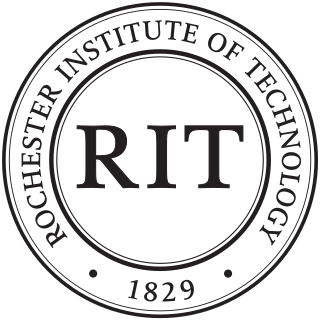
Rochester Institute of Technology (RIT) is a private research university in the town of Henrietta in the Rochester, New York, metropolitan area. The university offers undergraduate and graduate degrees, including doctoral and professional degrees and online masters as well.

Wilberforce University is a private historically black university in Wilberforce, Ohio. Affiliated with the African Methodist Episcopal Church (AME), it was the first college to be owned and operated by African Americans. It participates in the United Negro College Fund.

Richard Allen was a minister, educator, writer, and one of America's most active and influential Black leaders. In 1794, he founded the African Methodist Episcopal Church (AME), the first independent Black denomination in the United States. He opened his first AME church in 1794 in Philadelphia, Pennsylvania.

The African Methodist Episcopal Church, usually called the AME Church or AME, is a predominantly African-American Methodist denomination. It adheres to Wesleyan-Arminian theology and has a connexional polity. The African Methodist Episcopal Church is the first independent Protestant denomination to be founded by black people, though it welcomes and has members of all ethnicities. It was founded by Richard Allen (1760–1831) - later elected and ordained first bishop in Philadelphia, Pennsylvania, in 1816 from calling together of five black congregations of the earlier established Methodist Episcopal Church on the East Coast / Middle-Atlantic states area in the first General Conference, who wanted to escape the discrimination that was commonplace in society. It was among the first denominations in the United States to be founded for this reason, rather than for theological distinctions, and has persistently advocated for the civil and human rights of African Americans through social improvement, religious autonomy, and political engagement, while always being open to people of all racial backgrounds. Allen, an previously ordained Deacon in the Methodist Episcopal Church, was elected by the gathered ministers and ordained / consecrated as its first bishop in 1816 by the first General Conference of the five churches - extending from the three in the Philadelphia area in Pennsylvania to one in Delaware and one in Maryland of Baltimore. The denomination then expanded west and through the South, particularly after the American Civil War (1861–1865). By 1906, the AME had a membership of about 500,000, more than the combined total of the two other predominantly Black American denominations - the Colored Methodist Episcopal Church in America and the African Methodist Episcopal Zion Church, making it the largest major African-American denomination of the Methodist traditions.

James Forten was an African-American abolitionist and wealthy businessman in Philadelphia, Pennsylvania. Born free in the city, he became a sailmaker after the American Revolutionary War. Following an apprenticeship, he became the foreman and bought the sail loft when his boss retired. Based on equipment he himself had developed, he established a highly profitable business. It was located on the busy waterfront of the Delaware River, in an area now called Penn's Landing.
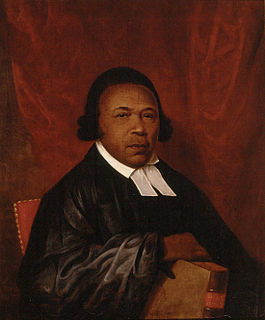
Absalom Jones was an African-American abolitionist and clergyman who became prominent in Philadelphia, Pennsylvania. Disappointed at the racial discrimination he experienced in a local Methodist church, he founded the Free African Society with Richard Allen in 1787, a mutual aid society for African Americans in the city. The Free African Society included many people newly freed from slavery after the American Revolutionary War.

The African Methodist Episcopal Zion Church, or the AME Zion Church (AMEZ) is a historically African-American Christian denomination based in the United States. It was officially formed in 1821 in New York City, but operated for a number of years before then. The African Methodist Episcopal Zion Church adheres to Wesleyan-Arminian theology.

The National Technical Institute for the Deaf (NTID) is the first and largest technological college in the world for students who are deaf or hard of hearing. As one of nine colleges within the Rochester Institute of Technology (RIT) in Rochester, New York, NTID provides academic programs, access, ASL in-class interpreters and support services—including on-site audiological, speech-language, and cochlear implant support. As of fall quarter 2012, NTID encompasses just under 10% of RIT's enrollment, 1259 students. Roughly 775 deaf and hard of hearing students are cross-registered into another RIT college's program with support from NTID.

Freedom's Journal was the first African-American owned and operated newspaper published in the United States. Founded by Rev. John Wilk and other free Black men in New York City, it was published weekly starting with the 16 March 1827 issue. Freedom's Journal was superseded in 1829 by The Rights of All, published between 1829 and 1830 by Samuel Cornish, the former senior editor of the Journal. The View covered it as part of Black History Month in 2021.
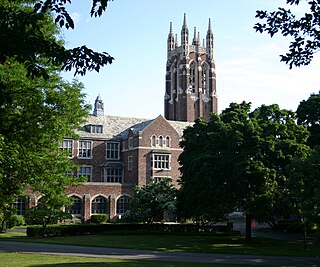
Colgate Rochester Crozer Divinity School is a seminary in Rochester, New York affiliated with the American Baptist Churches USA.

Daniel Alexander Payne was an American bishop, educator, college administrator and author. A major shaper of the African Methodist Episcopal Church (A.M.E.), Payne stressed education and preparation of ministers and introduced more order in the church, becoming its sixth bishop and serving for more than four decades (1852–1893) as well as becoming one of the founders of Wilberforce University in Ohio in 1856. In 1863 the AME Church bought the college and chose Payne to lead it; he became the first African-American president of a college in the United States and served in that position until 1877.
Archibald James Carey Jr. was an American lawyer, judge, politician, diplomat, and clergyman from the South Side of Chicago. He was elected as a city alderman and served for eight years under the patronage of the politician William L. Dawson. He served for several years as a pastor in the African Methodist Episcopal (AME) Church, when he became known as a civil rights activist. In 1957, he was appointed by President Dwight Eisenhower as chair of his committee on government employment policy, which worked to reduce racial discrimination.
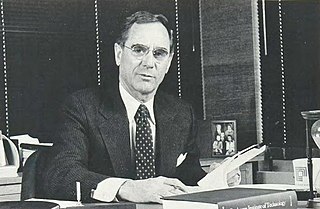
Merle Richard Rose was an American academic. He was the tenth president of Alfred University from 1974 until 1978, when he left to become the seventh president of the Rochester Institute of Technology from 1979 until 1992.

Frans Wildenhain also known as Franz Rudolf Wildenhain was a Bauhaus-trained German potter and sculptor, who taught for many years at the School for American Craftsmen at the Rochester Institute of Technology in Rochester, New York.
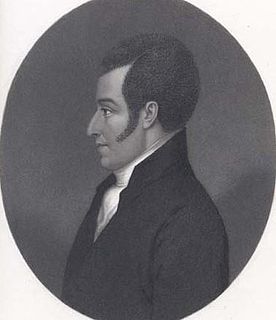
Daniel Coker (1780–1846), born Isaac Wright, was an African American of mixed race from Baltimore, Maryland; after he gained freedom from slavery, he became a Methodist minister. He wrote one of the few pamphlets published in the South that protested against slavery and supported abolition. In 1816 he helped found the African Methodist Episcopal Church, the first independent black denomination in the United States, at its first national convention in Philadelphia.

Saunders College of Business is one of eleven colleges at Rochester Institute of Technology and is accredited by the Association to Advance Collegiate Schools of Business International (AACSB). As of fall semester 2018, Saunders College of Business encompasses nearly 11% of RIT's enrollment, home to more than 2,000 undergraduate and graduate students enrolled in programs across RIT Global Campuses in Rochester, New York, Croatia, Dubai, Kosovo, and China.
Thomas James (1804–1891) had been a slave who became an African Methodist Episcopal Zion minister, abolitionist, administrator and author. He was active in New York and Massachusetts with abolitionists, and served with the American Missionary Association and the Union Army during the American Civil War to supervise the contraband camp in Louisville, Kentucky. After the war, he held national offices in the AME Church and was a missionary to black churches in Ohio. While in Massachusetts, he challenged the railroad's custom of forcing blacks into second-class carriages and won a reversal of the rule in the State Supreme Court. He wrote a short memoir published in 1886.
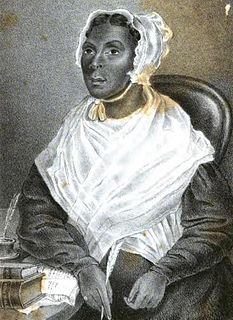
Jarena Lee was the first woman preacher in the African Methodist Episcopal Church (AME). Born into a free Black family, in New Jersey, Lee asked the founder of the AME church, Richard Allen, to be a preacher. Although Allen initially refused, after hearing her preach in 1819, Allen approved her preaching ministry. A leader in the Wesleyan-Holiness movement, Lee preached the doctrine of entire sanctification as an itinerant pastor throughout the pulpits of the African Methodist Episcopal denomination. In 1886, Lee became the first African American woman to publish her autobiography.

Sarah Allen was an American abolitionist and missionary for the African Methodist Episcopal Church. She is known within the AME Church as The Founding Mother.

Morris Brown was one of the founders of the African Methodist Episcopal Church, and its second presiding bishop. He founded Emanuel AME Church in his native Charleston, South Carolina. It was implicated in the slave uprising planned by Denmark Vesey, also of this church, and after that was suppressed, Brown was imprisoned for nearly a year. He was never convicted of a crime.
References
- ↑ Rochester Institute of Technology, Department of History
- ↑ RIT University News
- ↑ Archived July 4, 2008, at the Wayback Machine
- ↑ "The Miracle At Bethel", New Republic, June 3, 2009
- ↑ "Freedom’s Award-Winning Prophet", from the square, nyu press, June 8, 2009
- ↑ "Love Canal", Oxford University Press, May, 2016